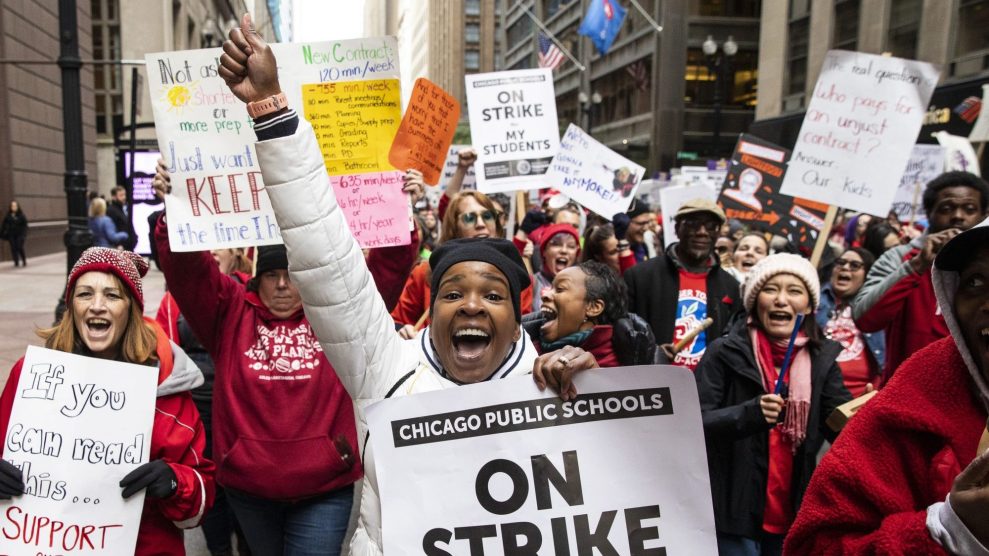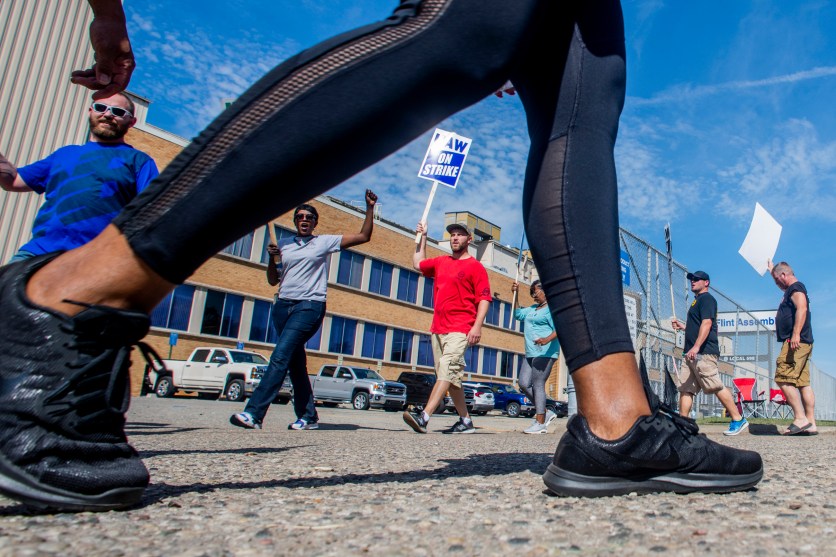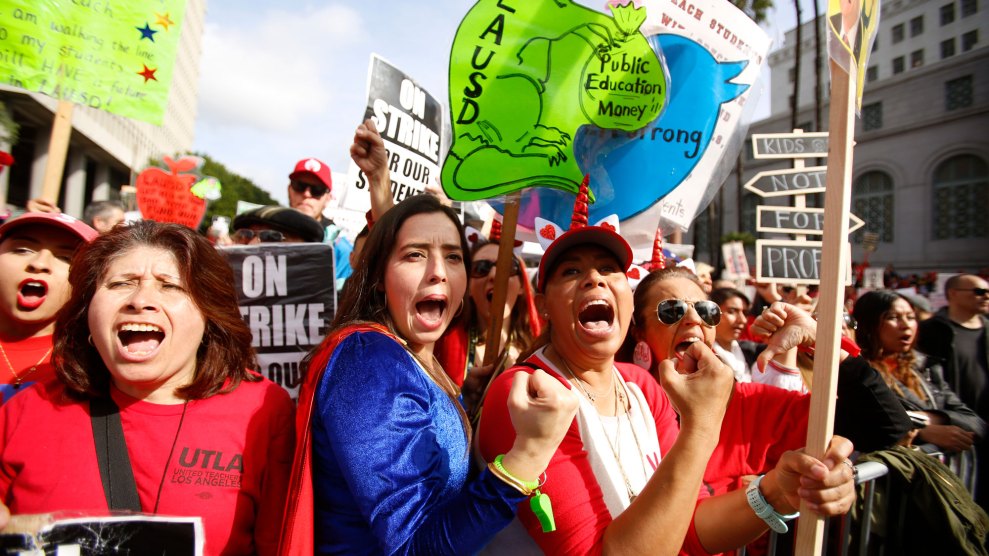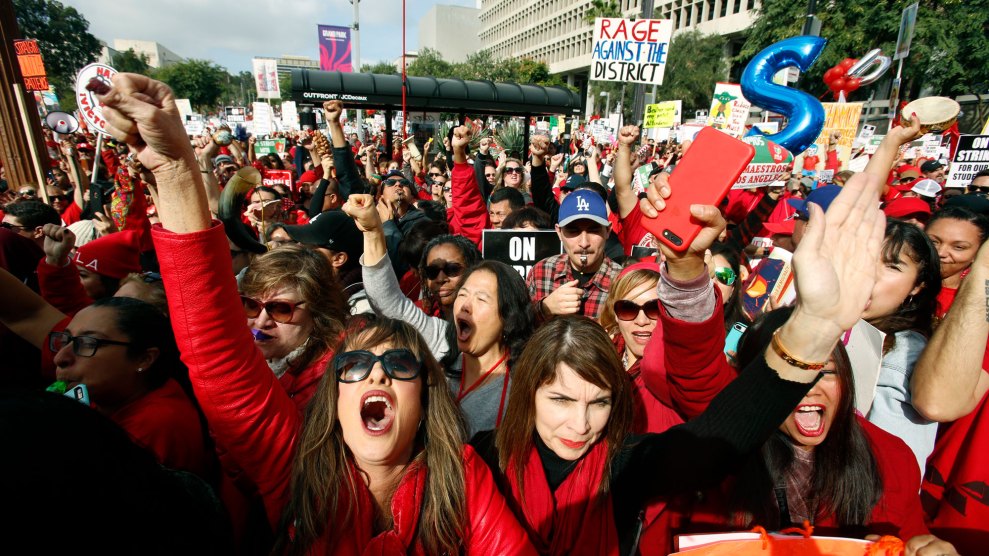
Thousands of striking Chicago Teachers Union members and their supporters march through Chicago's Loop on Thursday.Ashlee Rezin Garcia/Chicago Sun-Times via AP
On Thursday, after months of negotiations, tens of thousands of Chicago teachers stepped away from the classroom to strike on behalf of what the city’s schools CEO, Janice Jackson, calls a “social justice bargaining” agenda. She used the phrase sneeringly, but what was there to sneer at? In addition to the standard suite of educator demands—pay raises, a reduction in class sizes, more social workers and nurses—the Chicago Teachers Union is calling on the city to increase funding for affordable housing, hire staff to help homeless students, and expand community schools that offer “wraparound” services for students. Educators are asking Chicago to address the gaps in social provision they’re too often called upon to fill themselves.
These are a unique set of demands, from a union that played an outsized role in re-energizing the labor movement and raising worker expectations around the country. Going up against then-Mayor Rahm Emanuel during their 2012 strike, Chicago teachers likewise went beyond simple bread-and-butter issues like pay and made demands for broader social change, framing the issue as one of racial equity. This is known as “bargaining for the public good,” and teacher unions are increasingly adopting the approach. Earlier this year, in Los Angeles, teachers parlayed a walkout during contract negotiations into more funding for nurses and social workers, reduced class sizes, and even limits to police searches.
Ahead of Thursday’s strike, I spoke to Stacy Davis Gates, vice president of the Chicago Teachers Union, to talk about the teachers’ return to the picket line and the meaning of bargaining for the public good.
What’s the current status of negotiations?
There’s a bit of resignation on the other side of the table. But also, the other side of the table doesn’t understand how to do equity and justice with respect to a collective bargaining agreement, because the Chicago Public Schools have a long history of inequity and injustice. And so what we are asking them to do in this moment is something that they don’t have much of a muscle for.
What are the core differences between the two sides?
The Chicago Teachers Union sees this collective bargaining agreement as something that helps to reposition and transform our school districts. Chicago Public Schools sees this as a power move. And not understanding the function of school—and what those workers who are in the schools are asking for—is a fundamental difference in our positions and is why we’re so far apart.
Chicago Public Schools CEO Janice Jackson called CTU’s approach “social justice bargaining.” How do you respond to that characterization?
Look, I don’t know any teacher who made a choice to teach in the Chicago Public Schools who does not see their role as a change agent. You don’t teach in Englewood, Roseland, or West Garfield Park to maintain status quo. You teach there because you want children in those environments to understand potential, to understand their ability to shift potential in that space and to be better as people. So I don’t understand what she doesn’t understand.
In that sense, as you guys are fighting for more than just pay and benefits, going beyond the mandatory parts of this bargaining…
We don’t become teachers because we’re trying to get rich. Wall Street, LaSalle Street, those are places for people who are driven by money.
Our members are driven by service to children in the city, and in order to do the services for the children in the city, their families, and the communities that they inhabit, you need resources and you need staff in order to do it, or else you’re just maintaining status quo. It is the worst thing in the world as an educator to go home every single night and feel like you failed the students in front of you. It is terrible. And because it feels like that, you have people who have now found their power and their voice and are pushing for something better. It is not fair for us to go into school communities and to manage poverty. It is not fair for our teachers to go into these school communities and manage the lack of resources and to manage white supremacy and to manage low expectations.
Our children are put in a position where they have to adjust to everything bad in this world. That’s unfair. What the educators in the Chicago Teachers Union are saying in this moment is that the adjusting needs to happen with the people who do not pay taxes. So in Chicago, we subsidize building the skyscrapers, we subsidize wealthy playgrounds in one of the richest neighborhoods in the world. But we don’t subsidize social workers and nurses for students in Austin. We don’t subsidize smaller class sizes for students in Chatham. What we do is that these things are exacerbated by the inequities that have been built into the system. And so you’re expecting a teacher to give and to do, but you give them nothing to do it with. That is unjust.
Chicago is a very expensive place, and it’s getting more and more expensive as the days go on. Chicago is also a place that evicted black people from its premises. They tore down public housing, and with the destruction of public housing, black people were pushed out of the city. And it contributes to the number of students who are homeless in this city. That’s a problem. How do you have children who don’t have homes that are before you on a daily basis and you don’t say something about it? But I gotta be honest with you. I don’t understand why this is such a big deal for other people to conceive of. Have you ever been in a classroom where you can ask, “Has anyone been impacted by gun violence?” and see the majority of hands go up in your classroom? Have you ever been in a classroom where you ask people if they live with your mom and dad and you don’t see a lot of hands go up that they live with an aunt, they live with the uncle, or they live with the godmother?
We are actually dealing with children who are living a very precarious existence because there is nothing here for them. Rahm closed mental health care clinics. He was a part of the destruction of public housing. He sat on Chicago Housing Authority money while the wait list for Section 8 continued to build out of this world. We live in a city where they closed 50 schools on black children and privatized a tremendous amount of others and those schools do not meet the needs of all students that attend it. Look, we are dealing with the impact of terrible social policy in this city, and it is unbelievable to me that people think we shouldn’t have a voice on that. We are responsible for that anytime you say that a kid has to take a test and the score on that test determines if I’m a good teacher or if I’m a bad teacher. And I know, number one, that the instruments you’re giving them is grounded in white supremacy and racism. Number two, if I don’t have a stable household, if my father doesn’t have a stable employment, that those test scores are not going to reach the level the district says they have to reach. So I’m dealing with all of these mandates by the district but have no resources from the district or the city that’s in control of the district. That’s the problem.
Why is it important to talk about education in harmony with other issues like support staff and affordable housing?
Because in school districts where achievement is the norm, students have stable household environments. They have parents who are not incarcerated. They have neighborhoods that are not besieged by gun violence, right? Those things are important. Stability is important. Safety is important. Employment is important. Housing is important. Those things contribute to academic achievement. And so if you’re not building school policy that looks like that, that supports that, you’re in trouble. We’re under mayoral control. So our boss is actually in control of everything in this city. Why would we ask our boss who is in control of housing, who is in control of employment, who is in control of development, who is in control of public safety, to also not be in control of giving those things to the spaces in the city that have been neglected for generations? It makes sense to me.
What do you make of Mayor Lightfoot saying that it’s not appropriate to talk about affordable housing?
Well, if it was already here and she had done her job, then we wouldn’t have to talk about it. So the ball is in her court. If she doesn’t want us to talk about it, then deal with it.
What does a win look like as you push for affordable housing?
You can look at this in two ways. Everyone in our union is not a teacher. We have teachers’ assistants. We have school clerks, support personnel. Two-thirds of our support personnel, their children qualify for free and reduced lunch. So we want those women, because it’s largely women, largely women of color, we want them to be able to afford to live in the city of Chicago. And so we want what they give to police officers and firemen in the city to make vying in this city affordable. That’s number one. Number two, we want our families connected to the city services that offer relief when you are homeless, when you are housing insecure. We want to have a point person [for the members of] the school community who are suffering through unaffordability and homelessness the most. We want a person there able to connect those families to the services that are in the city to make sure that people who are being impacted by that trauma are getting help. It’s not a huge ask. It just really isn’t.
Mayor Lightfoot has said it’s too expensive to respond to all those demands. How do you respond to that?
That’s dumb. That’s how I respond to it. Again, this city has subsidized the construction of skyscrapers. Taxpayers in the city of Chicago have paid for skyscrapers that 99 percent of them have never been in. The city of Chicago is literally building a playground for wealthy people in Lincoln Park to have a good time, and students do not have homes. That is a question of morality.
How does this moment compare to 2012 when the teachers went on strike?
Look, it’s not a moment. It’s a movement. We believe that this work is a part of a movement. Moments are fleeting. Movements are sustaining. They involve more than a union. They involve community. They involve children, they involve parents and families. We don’t see this in comparison. We see this as an extension, as an expansion of the work we’ve been putting forth for the last decade.
As a mother of three kids in Chicago’s schools, how do you see that influence your approach to fighting for a contract?
I became a high school English teacher in Englewood, in Humboldt Park, in North Lawndale because children in places that have been forgotten about by city leadership for generations, those children need to know that they have value, that they matter. And my fight for my children isn’t any different from any other child in the city because my children will have to live in this city with other people. That’s why I fight so hard. If I want my children to have a well-resourced school, I want someone else’s child to have a well-resourced school. If I want my child to have a librarian, I’m going to fight for the next child to have a librarian. My children cannot live in this world by themselves. They live in this world with other people, and I want those other people to be loved. I want those other people to have had resources and to be able to interact with my children in productive, safe ways. That’s it, man. We live in a society. We don’t live on island. We don’t live in isolation. We live in neighborhoods with people. Those people need things. And in this city, we have forgotten that.






